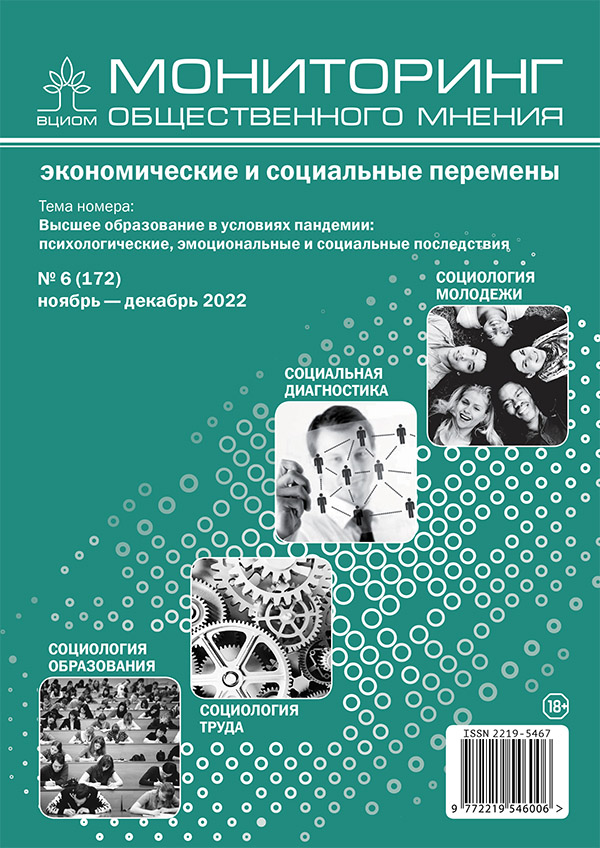Влияние пандемии на представления о профессиональной роли врача у студентов медицинских специальностей
DOI:
https://doi.org/10.14515/monitoring.2022.6.2286Ключевые слова:
пандемия COVID-19, высшее образование, студенты-медики, медицинское образование, дистанционное образование, профессиональные роли, социальное служение, волонтерство, клятва врача, религиозная идентичность, религиозное сознание, волонтерское движение медиковАннотация
Пандемия COVID-19 внесла существенные коррективы в представления о состоянии и функционировании системы современного здравоохранения многих стран. Вопросы соотношения рационализации и коммерциализации медицинской сферы, с одной стороны, и требований бескорыстной помощи и морального отклика от врачей, с другой, стали не просто предметом общественных дискуссий, а настоящим вызовом медицинскому сообществу. В особой ситуации оказались студенты медицинских специальностей, ощутив перекрестное воздействие двух причинных комплексов: трансформации в образовательном процессе и тяжелой ноши социальной и личной ответственности при мобилизации медицинской сферы.
Статья посвящена ряду проблем: реакции на экстренную мобилизацию для борьбы с COVID-19; применению новых технологий в медицинском образовании и клинической практике; трансформации смыслов профессиональной роли врача у студентов-медиков; нравственной стороне профессии и субъективным смыслам, вкладываемым в профессию; воздействию религиозного фактора и востребованности волонтерской деятельности студентов-медиков. Работа основана на данных социологического исследования смешанного дизайна: репрезентативный опрос студентов медицинских факультетов Казани и Москвы (N = 2084), 12 экспертных интервью с ординаторами, преподавателями и врачами, две фокус-группы со студентами-медиками, февраль-май 2022 г.
Во время пандемии стала очевидной неприемлемость удаленных методов обучения для медицинского образования, поскольку оно связано с обучением в клинических условиях. Студентам и преподавателям пришлось адаптироваться к экстренному внедрению дистанционного обучения и методов лечения, использованию цифровых форм и инструментов. Студенты-медики оказались в сложной ситуации смещения традиционных смыслов профессии врача: пандемия породила неоднозначность выбора между нравственными задачами и рациональной выгодой; акцентировала недостатки и выгоды цифрового образования; высветила неспособность коммерциализированной медицины справляться с вызовами пандемии. Опыт участия студентов в волонтерском движении «Волонтеры-медики» стал востребованным в работе с ковид-пациентами. Предварительный практический опыт оказания медицинской помощи выявлен как основной параметр позитивного отклика на призыв к работе «красных зон». У студентов-медиков зафиксировано полярное отношение к экстренной мобилизации для борьбы с COVID-19. Сложная эпидемиологическая ситуация обусловила повышение престижа медицинской профессии, но в то же время обострила ее морально-нравственную нагруженность, в том числе повысила требовательность пациентов к эмоциональной включенности медиков.
Благодарность. Выражаем искреннюю благодарность коллегам за помощь в организации полевого этапа исследования: директору МИ РУДН, д. м. н, профессору А. Ю. Абрамову; ректору Казанского ГМУ проф. А. С. Созинову; проректору Казанского ГМУ к. соц. н. А. Р. Заляеву; директору Института фундаментальной медицины и биологии КФУ проф. А. П. Киясову; декану Высшей школы медицины ИФМиБ КФУ, к. м. н., Д. И. Андреевой; директору Казанского медицинского колледжа, д. м. н., З. А. Хисамутдиновой; зам. директора по воспитательной работе Казанского медицинского колледжа Г. Ф. Гилязовой. Особую благодарность выражаем доценту кафедры биомедэтики, медицинского права и истории медицины Казанского ГМУ, к. ю. н. О. М. Смирновой за помощь на всех этапах проведения исследования.
Статья представлена в рамках реализации проекта ЭИСИ и Минобрнауки FSSF-2022-0040 «Российская идентичность: политические смыслы и индикаторы ценностной консолидации».
Загрузки
Опубликован
Как цитировать
Выпуск
Раздел
Лицензия
Copyright (c) 2022 Мониторинг общественного мнения: экономические и социальные перемены

Это произведение доступно по лицензии Creative Commons «Attribution-NonCommercial-ShareAlike» («Атрибуция — Некоммерческое использование — На тех же условиях») 4.0 Всемирная.






